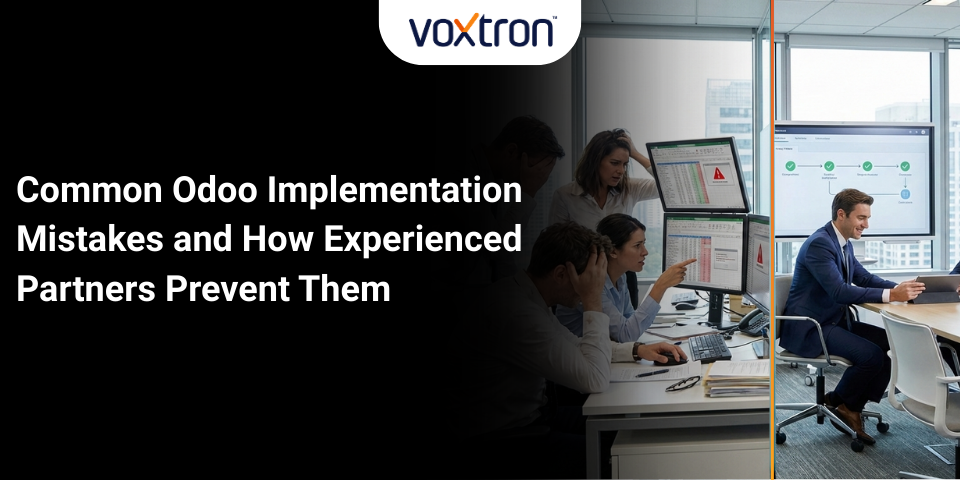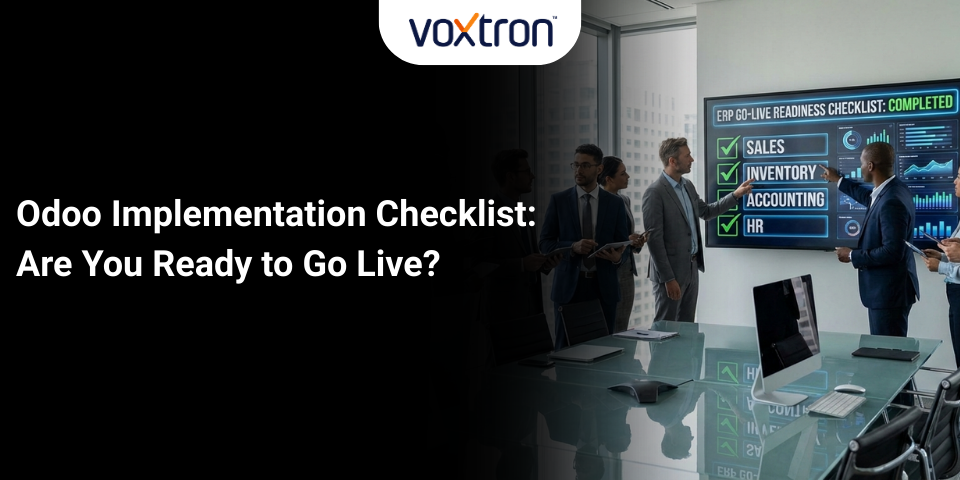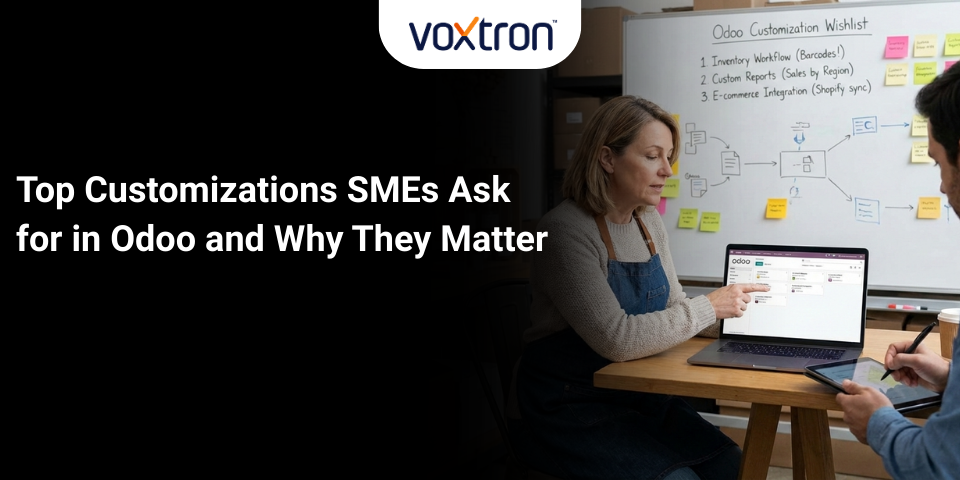
Are You Losing Customers Due to Poor Contact Center Efficiency? Discover How CCaaS Can Help
September 16, 2025
Driving Adoption After ERP Go-Live: Getting the Most from Your Odoo Investment
September 17, 2025What Your Employees Should Know Before Transitioning to Odoo
Over the years, Odoo has grown from being a simple open-source ERP into a globally recognized platform used by organizations of every size.
What makes Odoo especially relevant today is how it has kept pace with digital transformation trends. Cloud deployment options, mobile accessibility, and industry-specific applications have made it easier for businesses to stay agile while meeting modern customer expectations.
Companies that embraced Odoo early on have benefited from more integrated processes, better data visibility, and the ability to adapt quickly to market changes.
In other words, Odoo is not just keeping up with the future of work. It is helping shape it.
However, successful ERP transitions are rarely determined by software alone. They also depend on how well users adapt to it.
Whether you are implementing Odoo as a complete ERP or rolling out selected modules step by step, your employees will be at the heart of the change.
Thus, preparing employees for the shift is just as important as configuring the software itself.
In this article, we’ll look at what your employees should know before transitioning to Odoo, the challenges you may face, and how working with an experienced Odoo Gold Partner can make the process smoother.
Change Management is Key
Traditional ERP and legacy systems often demand heavy customization, manual interventions, and rigid processes. Odoo, however, offers a more flexible and user-friendly approach with integrated modules that reduce duplication of work and streamline operations. From an organizational standpoint, this shift is clearly an upgrade.
However, employees may not immediately see it that way. Even if the old system had flaws, it was familiar. Hence, employees may find it safe and convenient. They may resist the change to Odoo due to fear of disruption or concern about learning something new.
Convincing your team about how Odoo will actually make their work easier is critical.
Before implementation, it helps to:
- Communicate the “why”: Explain why your company is moving to Odoo and how it will improve day-to-day work.
- Set realistic expectations: Employees should understand that the first few weeks may feel slower as they adapt.
- Involve them early: Teams that are part of the transition process are far more likely to embrace the change.
Training Should Start Early
One of the most common challenges of Odoo implementation is underestimating the training effort required. Unlike traditional ERP systems, Odoo is modular and highly customizable. This flexibility is a strength. However, it also means workflows may not look identical to what employees currently follow. Without proper training, employees can become frustrated, make errors, or revert to old habits outside the system, defeating the purpose of implementation.
For example, a finance team may need to understand how Odoo automates journal entries, tax calculations, or bank reconciliations. They may have handled these tasks manually before.
Practical tips:
- Start with hands-on workshops rather than lengthy presentations.
- Train department by department (sales, finance, HR, inventory, etc.), so employees focus on their own workflows first.
- Provide user-friendly documentation and quick reference guides.
Remember, training is not a one-time event. Reinforcement and refreshers are crucial to build confidence.
Data Migration Can Be a Bottleneck
Migrating data from an old system to Odoo is often complex. Odoo has its own structures, field requirements, and validation rules. So, simple export/import rarely works. If not handled carefully, it can result in missing records, mismatched fields, or financial inconsistencies.
What employees should know is that migration requires their input. Their feedback during testing ensures that critical information is not lost or misaligned.
The main challenges include:
- Data mapping: Old fields (e.g., “Customer ID”) must align with Odoo’s structure (e.g., “Partner ID”).
- Scripts and automation: Large volumes require migration scripts or ETL tools, not manual transfers.
- Data cleansing: Employees may be asked to help identify duplicates or outdated records before migration.
- Testing and validation: Mock transfers allow staff to check if customers, invoices, products, and balances appear correctly.
- Backups and rollback: Employees should know that backups are in place. So, there is no risk of information being lost during testing.
To make the transition smoother and efficient, employees need to stay actively involved in reviewing data, reporting discrepancies, and validating results.
Workflows May Change
Employees should know that Odoo will not always replicate their existing processes. Instead, it often standardizes workflows for efficiency and compliance.
- Some tasks may be automated.
- Approvals may shift from manual to digital.
- Some processes may be shorter, while others may add checks for accuracy.
The leadership should encourage employees to see this as an opportunity to improve rather than a disruption.
Why is it important to have the Right Odoo Partner?
Odoo’s flexibility is one of its greatest strengths. However, making the system work seamlessly for your business calls for expert customization and configuration.
A trusted Odoo partner will:
- Tailor the system to your business: Ensuring Odoo supports your unique workflows rather than forcing you into a rigid, one-size-fits-all model.
- Provide targeted training and support: Aligning learning resources with the specific needs of your teams.
- Anticipate and mitigate challenges: Addressing potential issues before they disrupt operations.
With the right partner in place, your employees can concentrate on learning and adapting to Odoo, instead of troubleshooting technical obstacles.
It is also important for employees to understand that Odoo implementation is not a one-time event. The system will continue to evolve—new modules may be introduced, processes refined, and feedback incorporated into improvements. Encouraging a culture of continuous learning and openness to change will keep your team engaged and invested in Odoo’s long-term success.
Conclusion
Transitioning to Odoo is a significant step for any organization. However, it doesn’t have to be overwhelming. With clear communication, early training, careful planning, and the guidance of the right partner, your employees can embrace the change with confidence.
As an experienced Odoo Gold Partner, Voxtron has successfully delivered implementations of varying scales across multiple industries in the Middle East.
We ensure that your investment in Odoo translates into a system that scales with your business and supports efficient, future-ready operations. Contact our team today to learn how we can equip your employees with this change in the best possible way.




